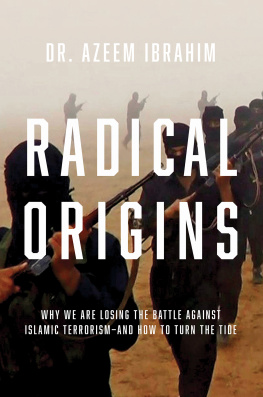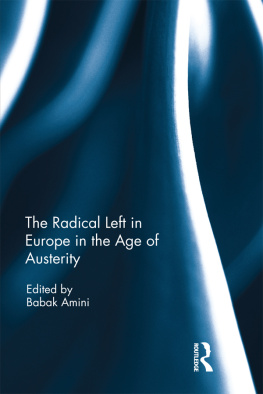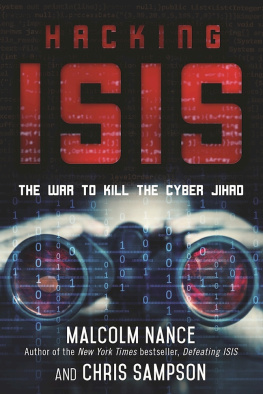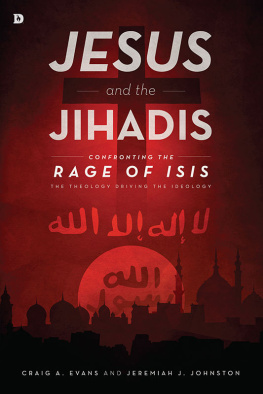Ibrahim - Radical Origins
Here you can read online Ibrahim - Radical Origins full text of the book (entire story) in english for free. Download pdf and epub, get meaning, cover and reviews about this ebook. City: New York, year: 2017, publisher: Pegasus Books, genre: Religion. Description of the work, (preface) as well as reviews are available. Best literature library LitArk.com created for fans of good reading and offers a wide selection of genres:
Romance novel
Science fiction
Adventure
Detective
Science
History
Home and family
Prose
Art
Politics
Computer
Non-fiction
Religion
Business
Children
Humor
Choose a favorite category and find really read worthwhile books. Enjoy immersion in the world of imagination, feel the emotions of the characters or learn something new for yourself, make an fascinating discovery.
Radical Origins: summary, description and annotation
We offer to read an annotation, description, summary or preface (depends on what the author of the book "Radical Origins" wrote himself). If you haven't found the necessary information about the book — write in the comments, we will try to find it.
Ibrahim: author's other books
Who wrote Radical Origins? Find out the surname, the name of the author of the book and a list of all author's works by series.
Radical Origins — read online for free the complete book (whole text) full work
Below is the text of the book, divided by pages. System saving the place of the last page read, allows you to conveniently read the book "Radical Origins" online for free, without having to search again every time where you left off. Put a bookmark, and you can go to the page where you finished reading at any time.
Font size:
Interval:
Bookmark:

RADICAL ORIGINS
WHY WE ARE LOSING THE BATTLE AGAINST ISLAMIC EXTREMISMAND HOW TO TURN THE TIDE
DR. AZEEM IBRAHIM

RADICAL ORIGINS
Pegasus Books Ltd.
148 W 37th Street, 13th Floor
New York, NY 10018
Copyright 2017 by Dr. Azeem Ibrahim
First Pegasus Books edition November 2017
Interior design by Maria Fernandez
All rights reserved. No part of this book may be reproduced in whole or in part without written permission from the publisher, except by reviewers who may quote brief excerpts in connection with a review in a newspaper, magazine, or electronic publication; nor may any part of this book be reproduced, stored in a retrieval system, or transmitted in any form or by any means electronic, mechanical, photocopying, recording, or other, without written permission from the publisher.
Library of Congress Cataloging-in-Publication Data is available.
ISBN: 978-1-68177-548-7
ISBN: 978-1-68177-601-9 (e-book)
Distributed by W. W. Norton & Company, Inc.
www.pegasusbooks.us
CONTENTS
The Abbasid dynasty: The third major Islamic dynasty. Noted for the intellectual activity that dominated up to the 11th century when the dynasty started to decline.
Jihad: In conventional Islam, any struggle to improve oneself and come closer to God. In Salafist terminology, invariably this means going to fight against unbelievers in a violent struggle.
Mardin Fatwa: A key document in Salafist ideology. Divides the world into an abode of war and an abode of peace (where what they see as true Islam rules). In turn is used to justify attacks not just on non-Muslims but also on those seen as being insufficiently pious, as their realms too fall into the abode of war.
The Muslim Brotherhood: Emerged in the postWorld War II era as an opposition to secular socialist states such as Egypt and Syria. Many of its leaders fled to Saudi Arabia, where they worked as engineers and in the universities. Modern-day violent Salafism is in part a fusion of the ideology of the Muslim Brotherhood and Saudi-sponsored Salafism.
Rashidun Caliphate: The rule of the first four caliphs after the death of Muhammed.
Salafism: The ideology that the Saudis now use to replace Wahhabism when they wish to spread their version of Islam.
Takfir , Takfirism: Another key part of the Salafist ideology. This argues that Muslim leaders who ally with the US/West, and any Muslims who do not condemn them (or fail to meet the demands of Salafist Islam in other ways), are apostates. This makes them legitimate targets for violent attacks.
The Umayyad dynasty: The first imperial Islamic dynasty established after Islam had spread across the Middle East, North Africa, and to the borders of modern-day India.
Wahhabism: Emerged in the 1760s in what is now modern-day Saudi Arabia. Claims to be a return to the purity of the early days of Islam.
ABBREVIATIONS
AQ: Al-Qaeda
AQI: Al-Qaeda in Iraq
ISIS: Islamic State in Iraq and Syriaalso known as Daesh or ISIL or IS.
T his book focuses on the major issue of our times: how to deal with the global rise of Islamist fundamentalism. This has been a growing issue ever since the defeat of the Soviet occupation of Afghanistan in 1988 and the deployment of US ground troops to Saudi Arabia in 1991 to deal with Saddam Husseins invasion of Kuwait. Initially, the Islamist insurgency was mostly organized by a relatively structured organization that took root in Taliban-controlled AfghanistanAl-Qaeda. Following the astounding success of the Islamists in the Afghan war in the 80s, the organization went from defending Muslim lands to a global offensive against all enemies of Islam that culminated in the 9/11 terrorist attacks on US home soil. This triggered President George Bushs War on Terror, an ill-defined conflict between the West and Islamism that rages to this day and which has come to define much of our understanding of geopolitics so far this century.
In the fifteen years since 2001, Al-Qaeda (AQ) itself has suffered many major defeats: it has lost most of its safe bases and most of its leadership, to a point where today it is but a shadow of the organization they usurped Al-Qaeda as the dominant force in global jihad and relegated our public enemy number 1 to a mere sideshow. Al-Qaeda had, for most practical intents and purposes, been defeated.
But even as Al-Qaeda currently flounders on the margins, we are now even farther from winning The War on Terror than we were on day one. ISIS has not merely taken over the mantle from Al-Qaeda: it has upped the ante on ideological extremism, on reach, on organization, on resources, and on the sheer brutality and violence towards those it does not see as true believers, both in the regions where it has some degree of physical control, and throughout the world through ever-growing jihadist networks.
This book argues that there has been a fundamental flaw in the Western approach to Islamic extremism. So far, our response to the global jihadi insurgency has been too focused on the areas where the militants have claimed physical control, like Afghanistan in 2001 and Iraq and Syria today. Indeed, military misadventures like the 2003 invasion of Iraq have no doubt made matters worse, by setting the scene for the rise of ISIS in that area. Rather, I argue, we should have focused on those global jihadist networks that are, even as we speak, expanding ever more into the undergrowth of our societies, on the economically, socially and culturally marginalized edges. This is where resentment against our civilization, our way of life seethes more than in the bazaars of Raqqa or Mosul, and where for many young Muslims caught in vicious cycles of petty criminality and a deep existential lack of direction, the opportunity to assert an identity separate from their
There are, of course, very many reasons why young peopleand it is overwhelmingly young menbecome radicalized. As many reasons as there are radicals themselves, we like to say. Social and economic factors, of course, but also political disenfranchisement, identity politics and the perceived erosion of traditional notions of masculinity, sexual frustration, alienation from family, problems with law enforcement, religious illiteracy and no doubt many other factors combine in different ways to push so many young, active people towards destructive and self-destructive ends.
But it has to be noted that these factors are not unique to young Sunni Muslim men. Across the world, they are extremely common for young people of all nationalities, races, and creeds. Yet it is nevertheless uniquely Sunni young men that go from seething in this poisonous soup of deprivation and resentment to terrorism, suicide bombing, and indiscriminate killing of innocent civilians on a mass scale. If only the underlying factors were enough to drive someone to such indiscriminate killing, then why do other groups who are even more marginalized not commit similar violence on a similar scale? Why are young blacks in inner-city United States not blowing themselves up in crowded public spaces, or why are Palestinian Christians in European ghettos not doing anything of the sort? In effect, at the end of feeling marginalized there must be an ideology that can convert that feeling of anger into the means to carry out acts of violence.
In many ways the use of suicide bombings has become the one thing that differentiates extremist Sunni terrorism from other violent responses by the excluded. It is, of course, not unique to them. The Hindu Tamil Tigers in Sri Lanka also used it extensively but in the context of their self-styled liberation struggle. The secular PLO certainly sent its fighters on missions that were guaranteed to end in their deaths. Equally Shia Muslims have also engaged in suicide bombing, Mass indiscriminate killing of civilians for no obvious immediate tactical purpose but in the name of some poorly understood higher purpose is indeed uniquely specific to Sunni jihadismand flows from the core ideology of Salafism that those who do not share their beliefs are, at best, flawed Muslims but most likely are either apostates or a threat to true believers.
Next pageFont size:
Interval:
Bookmark:
Similar books «Radical Origins»
Look at similar books to Radical Origins. We have selected literature similar in name and meaning in the hope of providing readers with more options to find new, interesting, not yet read works.
Discussion, reviews of the book Radical Origins and just readers' own opinions. Leave your comments, write what you think about the work, its meaning or the main characters. Specify what exactly you liked and what you didn't like, and why you think so.












